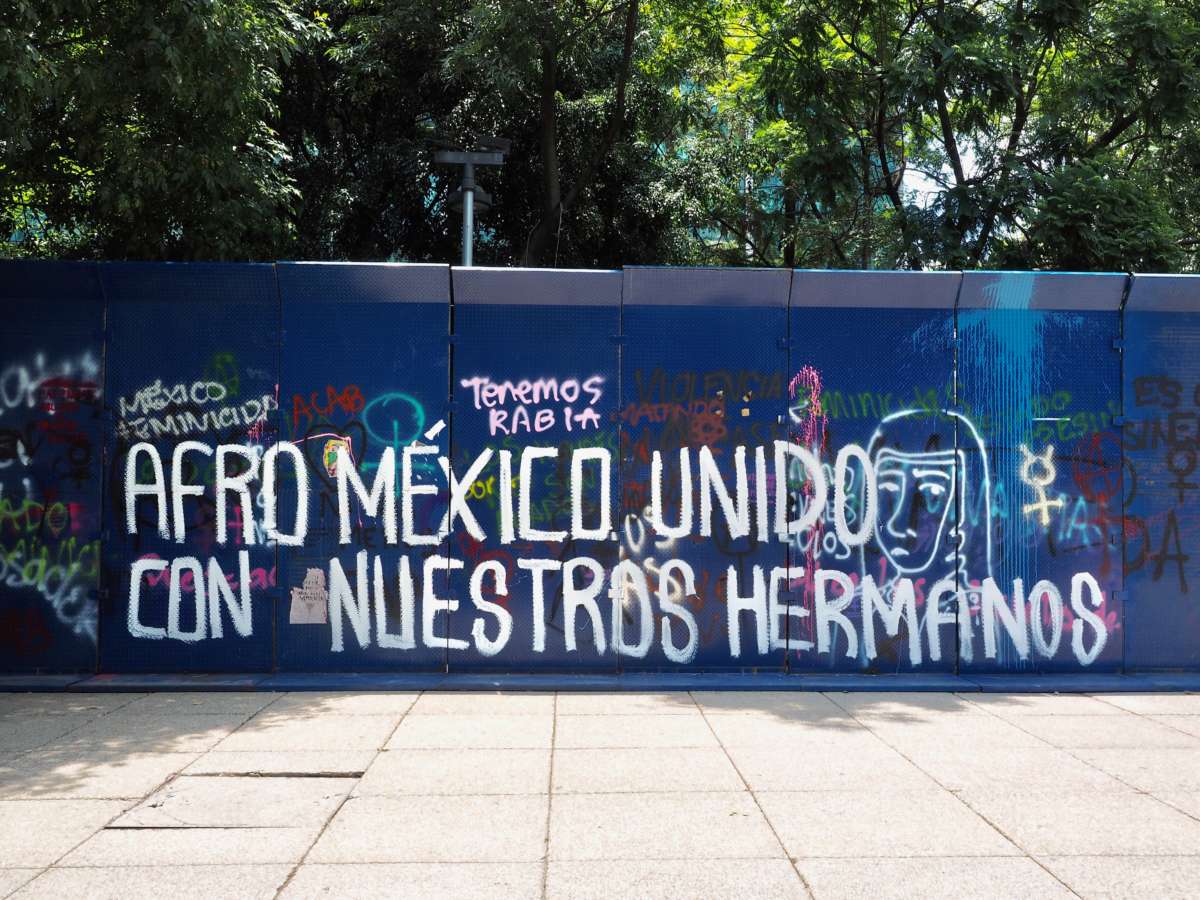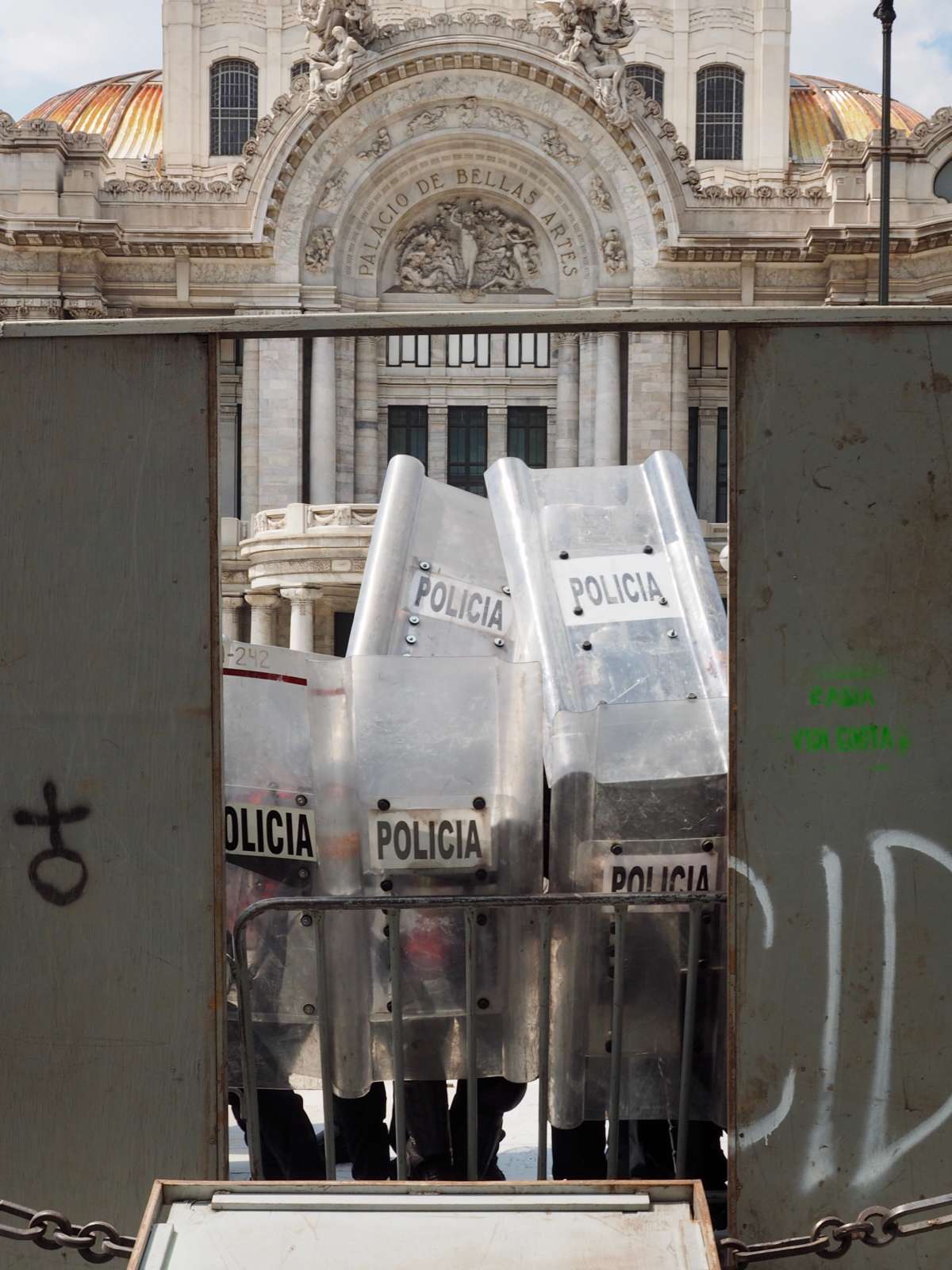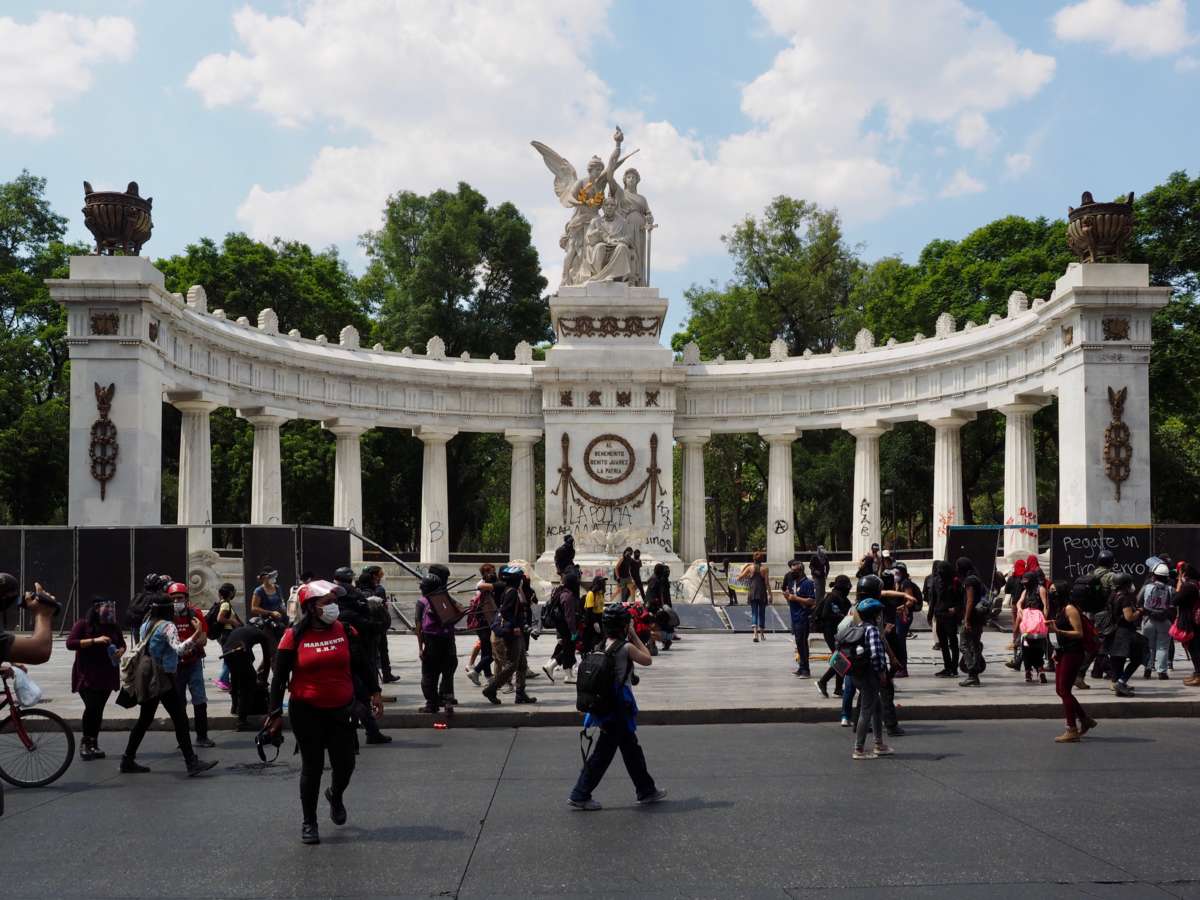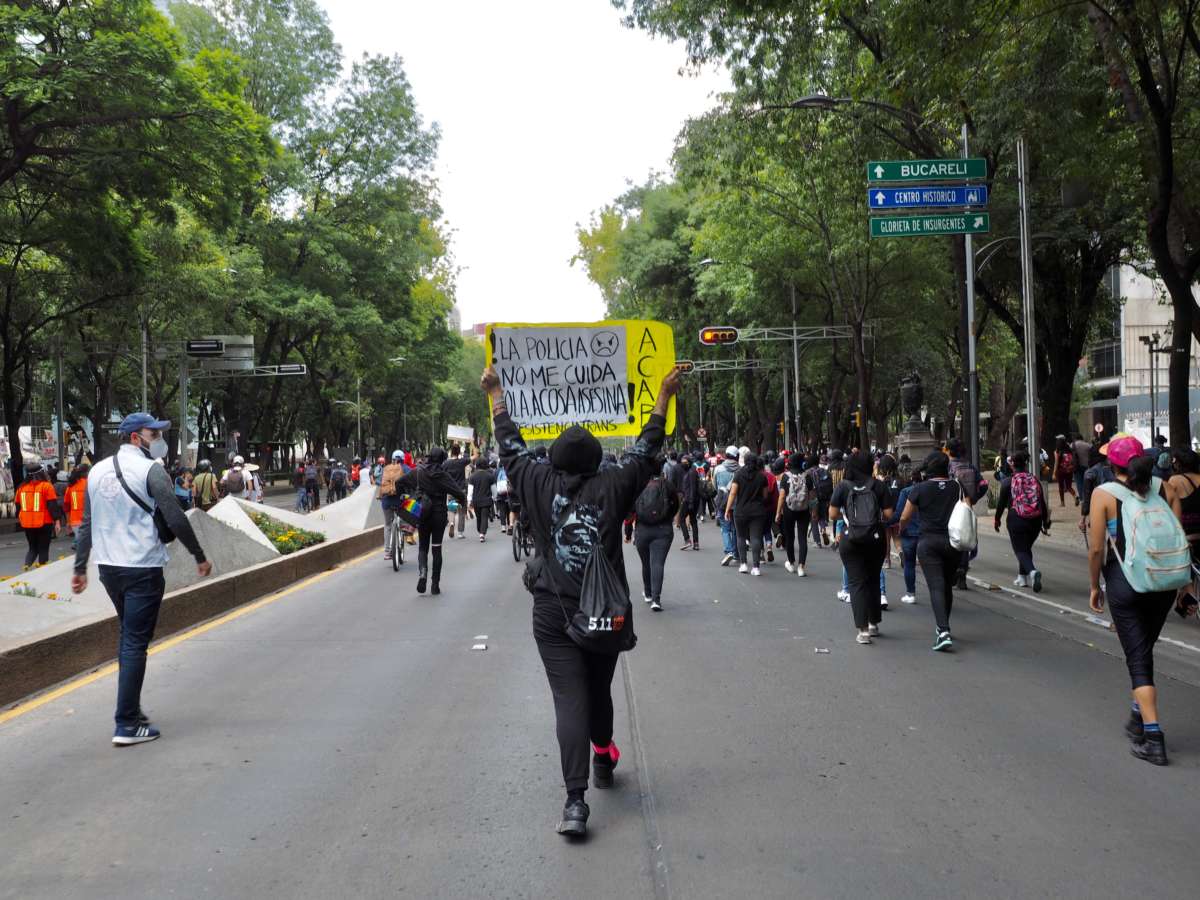Did you know that Truthout is a nonprofit and independently funded by readers like you? If you value what we do, please support our work with a donation.
In Mexico the police will kill you for not wearing a mask and the state will disappear you for demanding justice. This is the conclusion drawn by Alejandro Puerto, a young grassroots political activist in the state of Jalisco, who spoke with Truthout about the violence and repression doled out by the state government of Gov. Enrique Alfaro.
Inspired by the uprising against police brutality happening in the United States and tired of the regular abuses committed by state security forces at home, thousands took to the streets in Mexico in June to denounce the killing of Giovanni López by local police. They were met with brutal repression.
According to relatives, López, a 30-year-old construction worker from the town of Ixtlahuacán in the state of Jalisco, was detained in early May for being in public without a mask. His family struggled to ascertain his whereabouts, eventually discovering his body with apparent signs of torture in a morgue the following day. The Jalisco state human rights commission eventually concluded that the deadly beating delivered by police constituted an extrajudicial killing. López’s brother claimed the mayor of Ixtlahuacán even offered the family 200,000 pesos (a little under US$9,000) to stay silent but they rejected the offer and released a video of López’s detention that served to ignite the ire of the population.
In Guadalajara, the capital of Jalisco and Mexico’s second-largest city, several demonstrators were picked up by plainclothes police in unmarked vehicles before they could even make it to a protest and were told by the masked officers that they were going to be disappeared, a threat that is taken seriously in a country where state security forces have for decades engaged in forced disappearances against those deemed political opponents. Meanwhile, others were told they would be dismembered.
Adding to the people’s ire was the fact that Lopez’s death was seen as entirely preventable. Whereas the federal Mexican government has centered its response to the COVID-19 crisis on public health measures, such as shutting down workplaces — precisely to avoid giving authorities further powers to arbitrarily detain people and violate their human rights — the state government of Enrique Alfaro opted to place the burden on individuals.
“Enrique Alfaro focused his response on individual behavior and imposed this measure, the mandatory use of a facemask, which was very dangerous, and the end result that people wanted to avoid is precisely what ended up happening: the killing of a person for not wearing a facemask,” Puerto told Truthout.
But Puerto argues that that alone does not paint a complete picture of the circumstances that led to the death of López at the hands of police. He says the police have a propensity to behave differently depending on the socioeconomic status of the person they are investigating or the neighborhood where they are working.
Ixtlahuacán, where López lived, is one of the most marginalized neighborhoods in the metropolitan Guadalajara area, with two-thirds of its residents living in poverty or with some degree of social deprivation.
“In the most marginalized areas is where you find the most abuse of power, the most violent arrests, the bloodiest persecutions,” said Puerto. “Perhaps they thought that since it was a bricklayer from a poor neighborhood, there would be no consequences.”
The circumstances surrounding the killing of López, the apparent effort by state authorities to cover up the death of López at the hands of police, and the repression unleashed on those demanding justice served to highlight how in Mexico, as in the United States, being a working-class target of racism can be a death sentence and the path to justice is littered with obstacles.

Another Life Cut Short by Police
Barely one month later, another police killing in Mexico, this time in the southern state of Oaxaca, would once again awaken a hot rage in the population and their urgent desire to confront the plague of police brutality.
One hot night in the town of Acatlán de Pérez Figueroa, 16-year-old Alexander Martínez headed out with a group of friends celebrating a birthday to the local convenience store to buy soft drinks. On their way back, they came upon a police checkpoint, where police fired live ammunition upon the group, hitting Martínez in the head, who died on the spot. State officials would later claim that the checkpoint was there in connection with measures related to the COVID-19 pandemic and that the gun went off accidentally when it was dropped by an officer, who was subsequently arrested. A witness would later say that police tried to plant a gun on him to justify their actions.
And so, in both López’s and Martínez’s cases, as human rights defenders warned could happen, it was a COVID-19-related measure that ultimately led to their deaths at the hands of police.
Martínez was deeply loved by his friends and family. He dreamed of playing soccer professionally, and so his friends opted to bid him goodbye as only his friends could. In a video widely shared on social media, Martínez’s friends placed his coffin on a pitch, passed a ball between them, the final strike bouncing off his coffin and into the net, granting him one last goal with his team. After the ball went in, in the midst of cheers and tears, his friends gathered around the coffin and hugged their friend goodbye.
Police Are Exploiting COVID-19 Measures to Abuse Populations

Sara Méndez, coordinator with the Codigo DH human rights organization in Oaxaca, told Truthout that she, too, is critical of governments that have implemented a “heavy-handed” approach to the COVID-19 epidemic because they fail to address the root of the problem, which is about access to health care.
The strategy that sees people arrested or fined for not abiding by public health mandates, such as the use of a facemask, lends itself to abuse by authorities and absolves the state of its duty to provide care, instead placing it on the individual who may or may not have access to personal protective equipment, may not live near a clinic or hospital, or has no choice but to leave their homes in order to try to generate income for themselves and their families.
Méndez argues that the COVID-19 crisis has also served to expose all of the underlying problems in Mexican society, with people becoming more aware of the “structural problems” concerning public safety and policing that have not been resolved.
Youth in the town of Acatlán de Pérez Figueroa have expressed to local media that police harassment and mistreatment is constant. Méndez says her organization has documented a long list of abuses: arbitrary detentions, torture, mistreatments and extrajudicial executions. She adds that use-of-force guidelines are insufficient or routinely ignored, and the lack of a judicial system capable of prosecuting abuses opens the door to impunity, and as a result, people are continuously exposed to crimes by state security forces.
Méndez tells Truthout the legal system in Mexico often punishes the victims instead of the perpetrators and leads to a wider sense of exhaustion in society. She also points to notorious incidents of police violence in the state of Oaxaca, such as the 2006 violent eviction of a protest camp by teachers in the state capital that eventually led to a state-wide uprising, or the repression seen in 2016 where police fired live ammunition against protesting teachers, resulting in the deaths of six people.
“Oaxaca has a long history where it is not just one or two people but entire populations that are subject to police actions,” said Méndez.
In the last few months alone, police in Oaxaca were involved in the deaths of four youth in similar circumstances as those surrounding Alexander Martínez.
But Méndez says it is not just impunity that is responsible for the abuses perpetrated by state security forces and points to discrimination and racism against Indigenous and Afro-descendant peoples.
“At the end of the day, we have a country that has been built upon this ideology of mestizaje. The mestizaje ideology says that in this country there are no Indigenous people, everyone is mestizo, but when it does that, it erases the ethnic diversity that we have in Mexico,” said Méndez. “In Mexico, we have a tradition of not recognizing racism, a feeling that racism happens elsewhere but not in Mexico.”

It is this mestizaje ideology that has made it difficult for Mexico to confront its own practices of racism and discrimination, to even begin to have the conversation and acknowledge the erasure of Afro-descendent people in Mexico.
“These debates are urgent and necessary precisely in order to begin to revert that history of denial of racism,” said Méndez.
However, the question of how to address discrimination was forced into the spotlight after the federal agency in charge of tackling the issue, the National Council to Prevent Discrimination (CONAPRED), organized an online forum to discuss the problem but opted to invite Chumel Torres, an online personality famous for his racist, classist and discriminatory statements. Fallout over the decision to invite Torres eventually led to the cancellation of the forum, the resignation of the head of CONAPRED and the suspension of Torres’s program by HBO.
Mexican President Andrés Manuel López Obrador criticized the “bureaucratic apparatus” of CONAPRED, charging that it has not done enough to address discrimination, and has said that it is his wish to see an Indigenous woman at the head of the organization as a first step toward rectifying its work.
As in the U.S., however, it will likely take a mass movement in Mexico to begin to truly address the scourge of racism and discrimination and the violence it produces, particularly from state security forces. Fortunately, Mexican society has proven that it is capable of producing these mass movements. For example, recent mobilizations by feminist organizations in response to the alarming number of femicides have put the oppression of women onto the national agenda, forcing governments at all levels to respond. The recent protests over police brutality have shown that people are fed up and the movement is indeed growing.
A terrifying moment. We appeal for your support.
In the last weeks, we have witnessed an authoritarian assault on communities in Minnesota and across the nation.
The need for truthful, grassroots reporting is urgent at this cataclysmic historical moment. Yet, Trump-aligned billionaires and other allies have taken over many legacy media outlets — the culmination of a decades-long campaign to place control of the narrative into the hands of the political right.
We refuse to let Trump’s blatant propaganda machine go unchecked. Untethered to corporate ownership or advertisers, Truthout remains fearless in our reporting and our determination to use journalism as a tool for justice.
But we need your help just to fund our basic expenses. Over 80 percent of Truthout’s funding comes from small individual donations from our community of readers, and over a third of our total budget is supported by recurring monthly donors.
Truthout has launched a fundraiser to add 500 new monthly donors in the next 10 days. Whether you can make a small monthly donation or a larger one-time gift, Truthout only works with your support.
